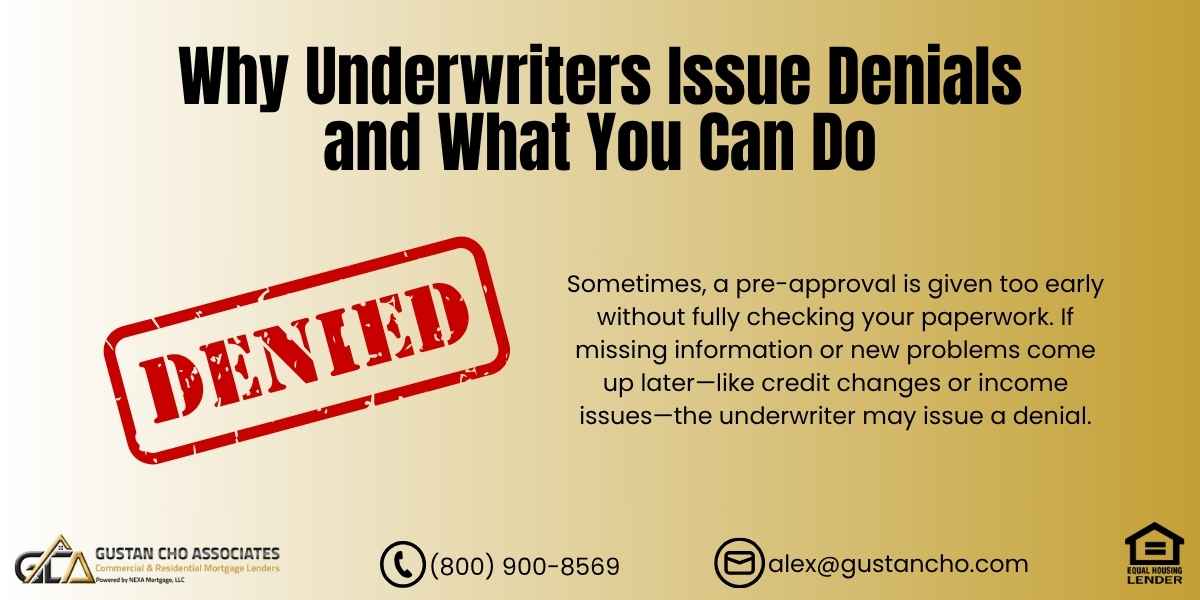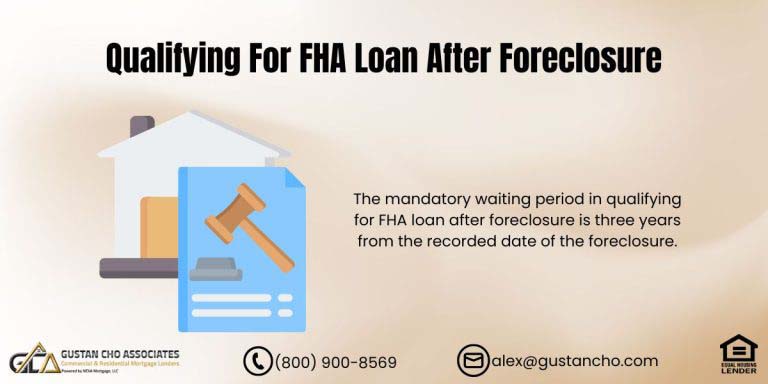This guide covers why underwriters issue denials on mortgage loans. The mortgage process should not be a stressful process and there is no reason why a mortgage loan should not close after a pre-approval has been issued. All mortgages should close on time and Gustan Cho Associates has a 21-day close policy on most loans. Delays can and often due occur and the main reason for closing delays is due to borrowers not having proper documents submitted to their loan officer in a timely manner.
Why Underwriters Issue Denials and Reasons For Closing Delays
When navigating the mortgage process, it’s important to be aware of potential obstacles that can delay closing. Here are the reasons a mortgage closing gets delayed:
1. Borrowers not submitting necessary documents.
2. Missing information on submitted documents.
3. Home appraisal value is lower than expected.
4. Need to renegotiate the purchase contract.
5. Issues found during the home inspection.
6. Negotiations on repairs or price between buyers and sellers.
7. Credit issues not reflected in the initial report.
8. Final walkthrough not meeting buyer’s expectations.
9. Borrower changing jobs during the process.
10. Irregular deposits or withdrawals that can’t be documented.
11. Minor issues discovered by the underwriter.
12. Errors on the credit report needing urgent correction.
13. Delays in verifying employment.
14. Delays from contractors on FHA 203k loans.
15. Higher-than-expected debt-to-income ratio.
16. About 8-11% of VA loans are denied in underwriting.
Being aware of these factors can help streamline the process and prevent unexpected delays.
Concerned About Unsourced Funds on Your Mortgage Application? Let Us Help You Understand the Process!
Contact us today to learn how to properly document your funds and keep your loan on track.
What is the Role of Mortgage Underwriters
Mortgage underwriters play a crucial role in the home loan approval process, evaluating the risk of lending money to applicants based on several criteria. When underwriters issue denials, it’s generally because they’ve identified specific risks or discrepancies in the loan application that make the applicant unsuitable for the loan under the lender’s criteria. In the following paragraphs, we will cover some common reasons why underwriters might deny a mortgage application.
Borrowers with High Debt-to-Income Ratio (DTI)
The DTI ratio, or Debt-to-Income ratio, is an essential metric used by lenders to assess how much of your paycheck goes toward paying off your monthly debts. To put it simply, to figure out your DTI ratio, take all your monthly debt payments and divide them by what you bring home each month before taxes. When lenders examine your loan application, they generally look for a debt-to-income (DTI) ratio of 43% or less.
It’s important to distinguish between gross and net income, as confusion around these terms can lead to misunderstandings about your financial situation. Gross income is what you earn before any deductions are made, while net income is your take-home pay after taxes and other deductions.
Additionally, it’s crucial to understand what counts as ‘debt’ when calculating your DTI. Generally, the following obligations are considered debt:
- Auto loans
- Credit card payments
- Student loans
- Personal loans
- Mortgage payments
On the other hand, some expenses do not count as debt in this calculation, including:
- Utilities (like electricity or water)
- Insurance premiums
- Living expenses (like groceries)
Keep in mind that DTI requirements can vary depending on the loan program. For instance, first-time homebuyer programs may allow for a higher DTI, while conventional loans might be stricter. Always check the specific guidelines for the type of loan you are considering.
In summary, understanding what counts as debt in your DTI calculation can help clarify your financial picture when applying for a mortgage. This way, you can avoid confusion and be better prepared for discussions with lenders.
Borrowers with Low Credit Scores
Your credit score shows how well you have managed and paid off debts in the past. A low credit score can result from late payments, high credit card balances, bankruptcy, or not having enough credit history.
Lenders use your credit score to determine how risky it is to give you a loan. They might deny your loan if you have a low score because it shows you are more likely to not repay it.
Borrowers with With Insufficient Income
Underwriters check if your income is stable and reliable enough to cover your monthly payments and other expenses. Suppose your income is inconsistent or not enough. In that case, it may lead to a denial because it raises doubts about your ability to repay the loan.
Why Underwriters Issue Denials due to Borrowers With Inadequate Employment History
Lenders typically look for a steady, stable employment history to gauge income stability.
Impact: Frequent job changes or recent unemployment can be red flags, leading to a denial based on the perceived risk of income interruption.
Why Underwriters Issue Denials due to Problems with the Property
Lack of Down Payment
A substantial down payment reduces the loan-to-value ratio and lessens the lender’s risk. Impact: Underwriters may deny a loan if the down payment is too small, increasing the financial risk for the lender.
Why Underwriters Issue Denials Due to Incomplete Application or Documentation
To evaluate a loan application, you need to submit a complete application and all required documents. If information is missing or incomplete, the underwriter might deny your loan because they cannot fully assess the risk or verify your information. A large down payment helps lower the loan-to-value ratio and reduces the lender’s risk. If your down payment is too small, underwriters may deny the loan due to higher financial risk for the lender.
Why Underwriters Issue Denials due to Derogatory Credit Events
Events like foreclosures, bankruptcies, or collections can severely impact your credit and indicate to lenders that you might be a high-risk borrower. Impact: Such events often result in loan denial unless sufficient time has passed, and you have demonstrated improved financial responsibility. Understanding these reasons can help applicants address potential issues before reapplying for a mortgage or to seek alternative financing solutions. Working with a mortgage professional to understand each aspect of the application and how to optimize it for approval is often beneficial.
Initial Mortgage Process
The pre-approval stage is the most important step in the mortgage process. The main reason Why Underwriters Issue Denials is due to loan officers not properly qualifying borrowers. Submitting a file to processing with a borrower who is not qualified is the major reason for loan delays or denials. Again, there is no reason why a solidly pre-approved borrower should not just close their home loan but close it on time. In the following paragraphs, we will cover why underwriters issue denials.
Worried About Unsourced Funds? Let Us Guide You Through the Mortgage Process!
Contact us today to learn how to properly source your funds and keep your mortgage moving forward.
How To Properly Qualify Homebuyers To Avoid Stress During Mortgage Process
Here is the initial pre-approval mortgage stage: Once the borrower consulted with the loan officer, the loan officer completes the mortgage loan application. The loan officer runs credit and reviews the overall credit report from all three credit bureaus. Loan officer requests required mortgage documents such as the following:
- tax returns
- W2s, paycheck stubs
- bank statements
- divorce documents if applicable
- bankruptcy paperwork if applicable
- child support paperwork if applicable
- any other pertinent documents
How Loan Officers Qualify Borrowers and Why Underwriters Deny Applications
Loan officers check the documents provided with a mortgage application and the credit report. They run the borrower’s information through the Automated Underwriting System (AUS). They hope to receive an approve/eligible status from the AUS.
The loan officer reviews the findings from the AUS and looks for any conditions that the borrower must meet based on these findings.
The borrower must have signed the loan application. After this, the loan officer submits the disclosure package to the opening department, where a mortgage processor is assigned to the file. The mortgage processor carefully reviews the entire file. They order verification of deposit, employment, and rent verification.
Once the mortgage processor confirms that the file is complete, they send it to the underwriting department, where a mortgage underwriter is assigned to the file. The loan processors ensure that all documents are in order.
Importance of Documents in the Mortgage Process
Make sure to have all the necessary supporting documents such as:
- W-2s
- income tax returns
- real estate purchase contracts
- appraisal
- tax information
- insurance bills for refinances
- paycheck stubs
- credit reports
- and all other necessary documents
The processor completes the package: If there is missing information that is needed, the processor will contact you. It is so very important to submit the processor’s request as soon as possible. Otherwise, your loan application will be delayed. Once the processor has all the necessary documents and completes the file, the processor then submits it to the lender to underwrite the loan.
Why Underwriters Issue Denials: Mortgage Underwriting Process
The mortgage underwriter checks the loan application to ensure it is complete. They perform a records search using services like Core Logic, Data Verify, or Lexis Nexis. If the application is organized and complete, the underwriter will issue a conditional loan approval.
Conditional loan approval occurs when the underwriter confirms that the borrower meets all the necessary requirements. Lenders must follow standards set by agencies like Fannie Mae or Freddie Mac, but mortgage guidelines can vary based on the loan terms. Approval for a loan mainly depends on two things: the borrower’s ability to repay the loan and the value of the property.
Conditional Loan Approval and Why Underwriters Issue Denials
Once a mortgage underwriter feels that the borrower meets all of the lending guidelines, the underwriter will issue a conditional loan approval. The conditional loan approval will be sent to the loan processor. Both the processor and loan officer will get to work in gathering all conditions. Once all of the conditions have been gathered, it is submitted to the underwriter for a clear-to-close.
The underwriter will check off on the conditions and normally will issue a clear to close. A clear to close means that the loan is ready to fund and docs should be prepared.
On rare occasions, a mortgage underwriter may add a few more conditions. The processor needs to get them and submit the additional conditions to the underwriter. Most underwriters will work with borrowers to get them approved. They have no intention on why underwriters issue denials.
The Final Process Prior To a Clear-to-Close
The underwriter then approves the loan and gives you a clear to close, which is the final step in the loan process. So if the borrower is properly qualified, there is no reason why underwriters issue denials. I do not remember why underwriters issue denials on the many files that I submitted. If you are in need of a fast pre-approval, please click APPLY NOW FOR MORTGAGE PRE-APPROVAL or contact us at Gustan Cho Associates at 800-900-8569 or text for a faster response. Or email us at gcho@gustancho.com. We are available 7 days a week, on evenings, weekends, and holidays to answer any questions or go over case scenarios.
Unsourced Funds on Your Mortgage Application? Let Us Help You Get Everything in Order!
Contact us today to learn how we can help you meet underwriting requirements and move forward with your loan.
Frequently Asked Questions About Why Underwriters Issue Denials:
Why do Underwriters Issue Denials Even After I’m Pre-Approved?
Sometimes, a pre-approval is given too early without fully checking your paperwork. If missing information or new problems come up later—like credit changes or income issues—the underwriter may deny the loan.
Can Underwriters Deny My Loan Because of My Credit Score?
Yes. One of the biggest reasons why underwriters issue denials is a low credit score. If you’ve missed payments, have high balances, or filed for bankruptcy, the lender may see you as a risk.
Will High Debt Stop Me from Getting a Mortgage?
It could. If your monthly debt (like credit cards or car loans) is too high compared to your income, that’s a red flag. That’s one reason why underwriters issue denials—your debt-to-income ratio is too high.
Can I Get Denied if My Job History is Spotty?
Yes. If you’ve changed jobs often or had recent gaps in employment, underwriters may worry about stable income. That’s another common reason why underwriters issue denials.
Why do Underwriters Care About My Down Payment?
If your down payment is too small, the loan becomes riskier for the lender. This is one of the reasons why underwriters issue denials—they want to see that you’re invested in the home.
Can Problems with the Home Cause My Loan to Get Denied?
Yes. If the home doesn’t appraise for enough or has major issues found during inspection, the loan may not go through. This is why underwriters issue denials even when your credit is okay.
What Happens if I Forget to Send All My Documents?
Missing bank statements, tax returns, or pay stubs can delay or deny your loan. One of the top reasons why underwriters issue denials is incomplete paperwork.
Can I Get Denied Because of Money in My Bank Account?
Yes. If you have large or “unexplained” deposits, and you can’t show where they came from, that’s a problem. It’s a key reason why underwriters issue denials for unsourced funds.
What if There’s an Error on My Credit Report?
A mistake on your credit report can mess up your loan. If it’s not fixed in time, it’s another reason why underwriters issue denials. You may need a credit supplement or rescore.
How Can I Avoid Getting Denied by an Underwriter?
Make sure you work with a loan officer who double-checks your credit, income, job, and documents early in the process. A strong pre-approval is your best defense against why underwriters issue denials.
This blog about “Why Underwriters Issue Denials and What You Can Do” was updated on December 15th, 2025.
Take First Step Toward Making Your Dream A Reality
Apply Now And Get recommendations From Loan Experts










